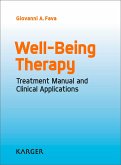Although data exist to support the notion that physician self-care is correlated with patient care, the culture of medicine has traditionally valued the ideals of self-sacrifice and perfectionism -- often to the detriment of clinicians themselves.
Professional Well-Being: Enhancing Wellness Among Psychiatrists, Psychologists, and Mental Health Clinicians, the result of a collaboration by several psychologists and psychiatrists in the School of Medicine at Stanford University, posits a new culture, one that is supportive of the health and well-being of health care professionals and the patients and populations they serve.
The book's first section examines individual and systemic barriers to professional well-being, chronicling the unique challenges faced by health care providers at different stages of professional and personal development. Detailed case studies and vignettes illustrate effective methods for reducing burnout while also enhancing professional fulfillment. Thought-provoking discussion questions encourage readers to focus on implementation tactics applicable to their own health care practices.
Part II discusses personal resilience and realistic strategies -- from the mental and social to the physical -- to improve well-being. Specific exercises encourage mental health professionals to engage in pragmatic action for improved personal and professional well-being.
Throughout the book, a wealth of tables and figures illustrate important points. The inclusion of "positive practices" and recommended readings offers readers the opportunity to integrate what they have learned and to expand their study.
Patients benefit when treated by clinicians who value and model self-care. Professional Well-Being outlines for mental health care providers, including psychiatrists, psychologists, mental health clinicians, and trainees, how to become such a professional.
Professional Well-Being: Enhancing Wellness Among Psychiatrists, Psychologists, and Mental Health Clinicians, the result of a collaboration by several psychologists and psychiatrists in the School of Medicine at Stanford University, posits a new culture, one that is supportive of the health and well-being of health care professionals and the patients and populations they serve.
The book's first section examines individual and systemic barriers to professional well-being, chronicling the unique challenges faced by health care providers at different stages of professional and personal development. Detailed case studies and vignettes illustrate effective methods for reducing burnout while also enhancing professional fulfillment. Thought-provoking discussion questions encourage readers to focus on implementation tactics applicable to their own health care practices.
Part II discusses personal resilience and realistic strategies -- from the mental and social to the physical -- to improve well-being. Specific exercises encourage mental health professionals to engage in pragmatic action for improved personal and professional well-being.
Throughout the book, a wealth of tables and figures illustrate important points. The inclusion of "positive practices" and recommended readings offers readers the opportunity to integrate what they have learned and to expand their study.
Patients benefit when treated by clinicians who value and model self-care. Professional Well-Being outlines for mental health care providers, including psychiatrists, psychologists, mental health clinicians, and trainees, how to become such a professional.
Dieser Download kann aus rechtlichen Gründen nur mit Rechnungsadresse in A, D ausgeliefert werden.









